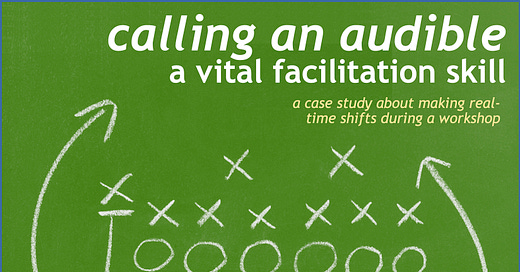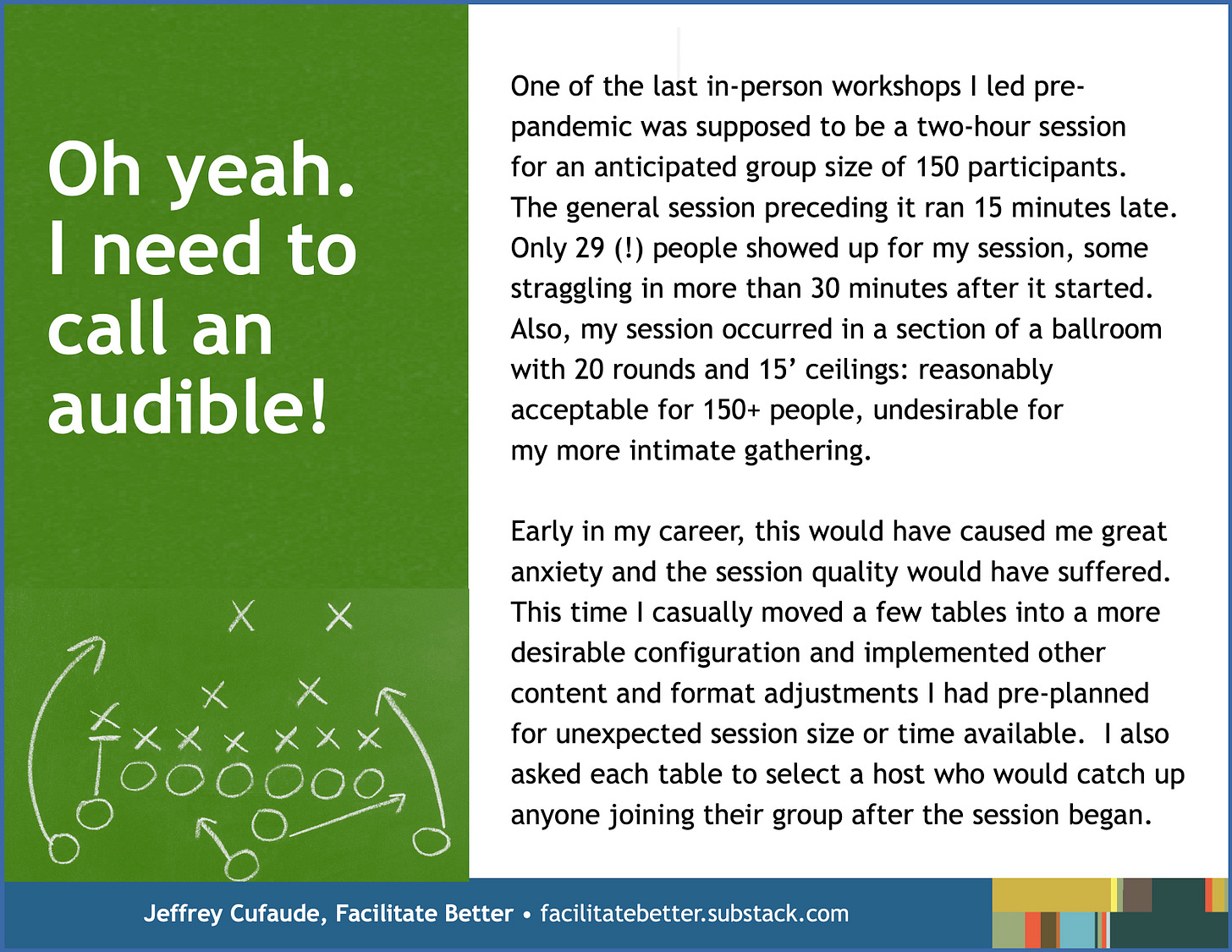The Best Facilitation Calls Audibles with Ease (Facilitation Friday #23)
When you can competently and comfortably make real-time content or format substitutions, you facilitate more effective learning experiences and meetings and better serve those attending.
The offensive coordinator calls a play. The quarterback communicates it to those on the field. But as he steps up to take the snap he notices something about the defense’s formation, something that makes him think a different play might be more effective. He calls an audible, a new play. The offensive line shifts formation for the new play and the ball is snapped.
Adjusting in the moment is not the exclusive domain of sports:
A cook adds some spices after tasting a sauce that seems too bland.
A theater actor ad-libs when an audience member’s cellphone goes off at a particularly awkward moment.
A jazz singer riffs in response to the tempo and tone of the musicians playing.
Calling an audible differs somewhat in that the adjustment usually involves executing a different play, not just making a small tweak. These plays are designed, learned, and practiced in advance to ensure successful execution when called.
As a workshop presenter or meeting facilitator, you’re essentially the quarterback of the participant experience. When you can competently and comfortably make real-time content or format substitutions in response to session conditions, you facilitate more effective learning experiences and meetings and better serve participants.
Deciding to call an audible
Quarterbacks call an audible when they see something in the opposing team that evokes uncertainty about the planned play. Workshop presenters or meeting facilitators might do so when they notice something about the participants, group dynamics, or session environment that gives them pause about their overall session design or what comes next on the agenda or outline.
Think of a time when you called a facilitation audible or experienced a facilitator seemingly calling one. What influenced that adjustment?
Likely it was because one or more of the following factors differed from what was anticipated:
Number of participants
Logistics (room set, lighting, AV or other tech, food and beverage, venue, time of day, sound bleed from the adjacent room)
Amount of time available (scheduled vs. actual)
Overall group energy, comfort with each other, mood
Accessibility or inclusion concerns
Attendees’ interest in and/or knowledge of the topic
Participants’ need for specificity, detail, and examples
Conditions external to the meeting or workshop (what else is happening in/at the organization, conference, industry, or world)
Preparing for real-time adjustments
Stuff is going to happen. Over time, you get better at anticipating, preparing for, and managing some of the likely conditions where calling an audible is desirable. Those of us who facilitate and speak for a living are expected to prepare for almost anything. That’s not as realistic if you’re leading a meeting or workshop as one of many other job or volunteer responsibilities.
To help focus your potential audibles prep, review your draft meeting or workshop design and answer these questions:
Which meeting agenda items, workshop content segments, or participation formats are most crucial to achieving the desired outcomes? In other words, what’s most problematic if it doesn’t occur as planned?
Which meeting agenda items, workshop content segments, or participation formats would be most difficult on the fly for you to tweak or call an audible and do a major substitution?
What, if it occurred, might panic you a bit of panic or provoke the greatest unease?
Your responses hopefully leave you with a manageable number of possible tweaks or audibles to prepare. If the list is still long, try prioritizing so you’re not overwhelmed.
For your final list, prepare your new “plays”: (1) create any necessary additional materials (slides, learning worksheets, et al) and (2) do the additional content review and run-through so you feel competent and comfortable with execution.
*I find calling audibles is much easier for in-person sessions if you always have these items on-hand: painter’s tape; varied sizes of index cards and Post-its®; markers; flipchart paper; and letter-size printouts of the numbers 1-10 (to post as gathering places for groups).
Executing the audible
Any meeting or learning experience involves multiple agenda items, content segments, and participation formats. Designed appropriately, these individual elements do not act in isolation. Instead, they are somewhat interdependent and often:
build upon previous elements and/or set up ones that follow
shift participant attention and focus in purposeful ways
are intentionally varied and sequenced to manage the energy and contributions of both introverted and extroverted participants
Tweaks and audibles both have a ripple effect on everything still to come in a session. Any significant adjustments you make may require other real-time shifts in order to guarantee the session’s success. Be sure to anticipate the potential consequences of any audibles you might call and prepare accordingly.
Involving participants
In the facilitation trainings I lead, I’m often asked if you should you let participants know you are calling an audible. I generally don’t unless I need their assistance executing the audible and/or they might benefit from understanding I am making a shift and the reason behind it.
Example:
(I would have a backup slide to display when calling this audible)
“Following the case study discussions you’re about to have, I originally planned on having each group verbally share its recommendations. We are running a bit tight on time, however, so instead in legible and large print, please flipchart your top three ideas. I’ll take pictures of your pages and send them out immediately after the session. You can take a look at the posted pages on your way out of the session as well.”
You may find yourself in a situation where you know a change is required, but you’re not sure which one participants might most value.
Example:
“We’ve had a really productive discussion on this agenda item, but it has used up a bit more time than originally planned. For the three remaining items would it be more useful to (1) cover them all, but more succinctly, (2) carry one of them forward to the next meeting so that the other two can receive more attention today, or (3) extend our scheduled meeting time by about 10 minutes and address all three?”
Bottom line?
A meeting agenda or workshop outline is a game plan for intended results. Anticipate and plan for likely tweaks and potential audibles. Then prepare yourself—and your content, logistics, and support materials like slides and learning worksheets—so making real-time adjustments is as stress-free for you and as seamless for participants as possible. Finally, cut yourself some slack for whatever occurs. Calling an audible based on what unfolds in the moment is about effectively executing a better alternative than your initial plan, not necessarily achieving perfection.
Getting in Action
Generate a short list of the most common facilitation scenarios you encounter where calling an audible might be desirable. Brainstorm a few options for how you might handle each one and the requisite materials and additional prep. Draw on these as needed for future meeting or workshop designs.
Think of the facilitation scenarios where you would be most nervous to call an audible. Identify ways to prepare yourself to make that choice more comfortably and competently.
Take a behind-the-scenes tour of my audibles prep for a 90-minute facilitation workshop using the materials below. Download the resource PDF to follow along as you listen to the audio file below (I suggest 1.25 speed). Skimming the PDF materials on their own will give you some insights, but in the audio I provide more detail about my approach, referencing the workshop outline and audible options, as well as the sample learning worksheets (handouts) in the PDF.
© Facilitate Better and Jeffrey Cufaude. All rights reserved.
To affordably license this content for reprint on your site or in electronic or print communications or to contact me regarding customized facilitation skills workshops or consultations, complete this form.





